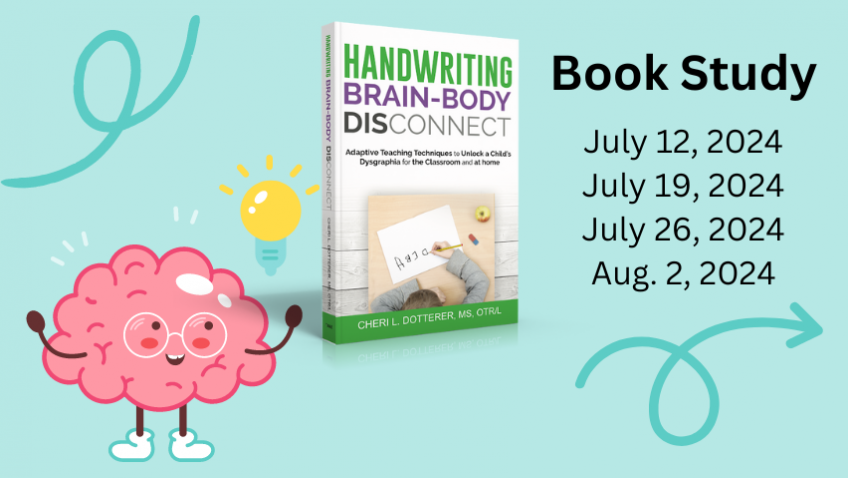Book Study- Handwriting Brain-Body Disconnect

America/New_York
-
FRI
02 AUG
- 09:00 AM
02 August 2024 Friday, 09:00 AM EDT
Webinar Session has ended now.
Why You Should Attend the "Handwriting Brain-Body Disconnect" Book Study
If you’re an educator, therapist, parent, or anyone interested in supporting children with dysgraphia, attending this book study on Handwriting Brain-Body Disconnect by Cheri Dotterer is an invaluable opportunity. Here are compelling reasons to join:
1. Deepen Your Understanding of Dysgraphia
•Comprehensive Knowledge: Gain a thorough understanding of the different types of dysgraphia and how they manifest in children.
•Brain Insights: Learn about the brain components involved in reading, writing, and visual perception, and how these impact children with dysgraphia.
2. Identify and Address Red Flags Early
•Early Detection: Discover the critical signs and symptoms that indicate a child might be struggling with dysgraphia.
•Practical Examples: See real-world case studies that highlight common issues and effective identification techniques.
3. Implement Effective Intervention Strategies
•Evidence-Based Methods: Learn about proven strategies and tools that can help support students with dysgraphia both in the classroom and at home.
•Classroom and Home Accommodations: Find out how to create supportive environments and make necessary accommodations to aid children’s learning and development.
4. Advocate for Long-term Support
•Individualized Plans: Develop tailored plans to meet the specific needs of each child, ensuring ongoing support and progress.
•Collaborative Efforts: Understand how to work effectively with parents, teachers, and other professionals to create a cohesive support system.
5. Engage with a Community of Professionals
•Networking Opportunities: Connect with other educators, therapists, and parents who share your passion for helping children with dysgraphia.
•Shared Learning: Benefit from the collective experience and insights of a diverse group of participants.
6. Enhance Your Professional Skills
•Continued Education: Add to your professional development by gaining specialized knowledge in dysgraphia.
•Certifiable Knowledge: Equip yourself with skills and information that can bolster your credentials and expertise.
7. Make a Positive Impact
•Student Success: Directly contribute to improving the educational experiences and outcomes for children struggling with dysgraphia.
•Personal Satisfaction: Experience the rewarding feeling of making a tangible difference in the lives of students and their families.
Incentives for Therapists to Attend the "Handwriting Brain-Body Disconnect" Book Study
1. Continuing Education Credits
•CEU Opportunities: Provide participants with the chance to earn Continuing Education Units (CEUs), which are essential for maintaining professional licensure and certifications.
2. Professional Development
•Skill Enhancement: Gain specialized knowledge in identifying and treating dysgraphia, which can enhance your practice and professional reputation.
•Career Advancement: Expand your expertise in a niche area, making you more valuable to employers and clients.
3. Exclusive Resources
•Access to Materials: Offer exclusive access to additional resources, worksheets, and intervention tools that can be used in their practice.
•Early Insights: Provide previews or early access to new research and developments in the field of dysgraphia.
4. Networking Opportunities
•Professional Connections: Network with other therapists, educators, and professionals in the field, fostering valuable connections and potential collaborations.
•Community Building: Become part of a supportive community focused on improving outcomes for children with dysgraphia.
5. Practical Case Studies
•Real-world Examples: Discuss and analyze real-life case studies, offering practical insights that can be directly applied in their work.
•Interactive Sessions: Engage in interactive discussions and problem-solving activities that enhance learning and application.
6. Certification and Recognition
•Certification: Provide a certificate of completion, recognizing their participation and commitment to professional development in dysgraphia.
•Recognition: Highlight participants' achievements in newsletters, social media, and professional platforms, giving them public acknowledgment.
7. Cost-Effective Learning
•Affordable Pricing: Offer the book study at a competitive price, ensuring it is a cost-effective way for therapists to gain valuable knowledge and skills.
•Group Discounts: Provide discounts for group registration, encouraging entire teams or departments to participate.
8. Flexible Learning Environment
•Convenient Schedule: Conduct sessions at convenient times that fit into therapists’ busy schedules, including options for recorded sessions for later viewing.
•Online Access: Utilize an accessible online platform, making it easy for participants to join from anywhere.
Problems Therapists Might Encounter That Warrant Attending the "Handwriting Brain-Body Disconnect" Book Study
1. Difficulty Diagnosing Dysgraphia
•Complex Symptoms: Encountering children with overlapping symptoms that make it challenging to distinguish dysgraphia from other learning disabilities.
•Lack of Knowledge: Limited understanding of the different types of dysgraphia and their specific characteristics.
2. Ineffective Intervention Strategies
•Limited Success: Current intervention methods do not yield significant improvements in handwriting and written expression.
•Need for New Approaches: Seeking innovative and evidence-based strategies to support students with dysgraphia better.
3. Poor Handwriting Skills
•Fine Motor Issues: Children struggling with fine motor skills that affect their handwriting ability.
•Illegible Writing: Persistent issues with illegible handwriting despite ongoing interventions.
4. Visual-Motor Integration Problems
•Coordination Challenges: Children have difficulty coordinating visual perception with motor execution, leading to poor handwriting and reading performance.
•Spatial Awareness Issues: Problems with spatial organization on paper, such as inconsistent letter sizing and spacing.
5. Academic Underperformance
•Writing Avoidance: Students avoid writing tasks due to frustration or low confidence, impacting their overall academic performance.
•Slow Writing Speed: Significantly slower writing speed compared to peers, affecting their ability to complete assignments on time.
6. Behavioral and Emotional Concerns
•Frustration and Anxiety: Children displaying signs of frustration, anxiety, or low self-esteem related to their writing difficulties.
•Classroom Disruption: Behavioral issues in the classroom stemming from the stress and frustration of writing tasks.
7. Communication and Collaboration Challenges
•Lack of Support: Difficulty in collaborating with teachers and parents to implement effective support strategies for children with dysgraphia.
•Inconsistent Strategies: A unified approach to intervention across home and school environments is needed.
8. Need for Professional Development
•Staying Updated: Keeping up with the latest research and best practices in diagnosing and treating dysgraphia.
•Specialized Knowledge: Expanding expertise in a specific area to enhance professional practice and better support students